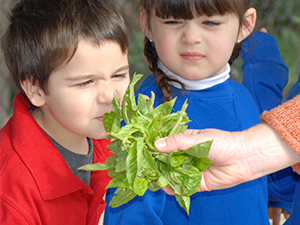Sensory Play – Child
 Engaging children’s senses during play can help them to focus, understand and remember more. Children’s sensory systems are strongly linked to memory and learning.
Engaging children’s senses during play can help them to focus, understand and remember more. Children’s sensory systems are strongly linked to memory and learning.
Think of the memories triggered when you smell cut grass, hot bitumen or perhaps sunscreen lotion.
Did you know?
Learning is improved when lots of our senses are engaged at the same time. That is why your child will learn more from real world experiences like seeing, hearing, touching, smelling, tasting, rather than from television, tablet devices or electronic games.
Add language
Add some more complex words to your child’s vocabulary like “delicious”, “tangy”, “bitter” or “savoury” as you smell or taste different foods. Ask occasional questions that get your child predicting what something might feel, sound, smell or taste like.
Other development
Comparing, contrasting and grouping things by sensory attributes i.e. smell, taste, colour, texture, sound etc. builds science and maths skills. Compare things that are loud and quiet, soft and hard, smooth and rough, sweet and savoury, etc.
Variations
Cooking together is a fabulous sensory activity. Children will love experiencing different textures like dough or cake mix; the smells of ingredients like vanilla, lemon, or garlic, as well as the smell of a baking cake, filling the kitchen; let alone the tastes and sights of the foods!
You can play “guess that smell” using items from the garden or kitchen, or experiment with taste and group different foods together using concepts like “the same” or “opposite” such as crunchy and soft.
Don’t forget the other senses too! Try listening games and lots of movement with your child to add to the sensory smorgasbord!
Encourage your child to give new things a go, try not to push them into doing something they don’t enjoy but show them it can be fun! We all have different sensory preferences and that’s ok. However, if you think your child’s sensory likes or dislikes are preventing them from participating in activities or doing their everyday routine, you might like to talk to your child health nurse or doctor.
Across the ages
All the activities listed on our “Play Ideas” page can be applied across different age groups. See how Sensory Play can be fun for babies, toddlers and playgroups.
Activities listed under “children” are suitable for children 3 years and older. Children of this age enjoy more complex activities where they can develop their skills and use their imagination while playing with friends.

